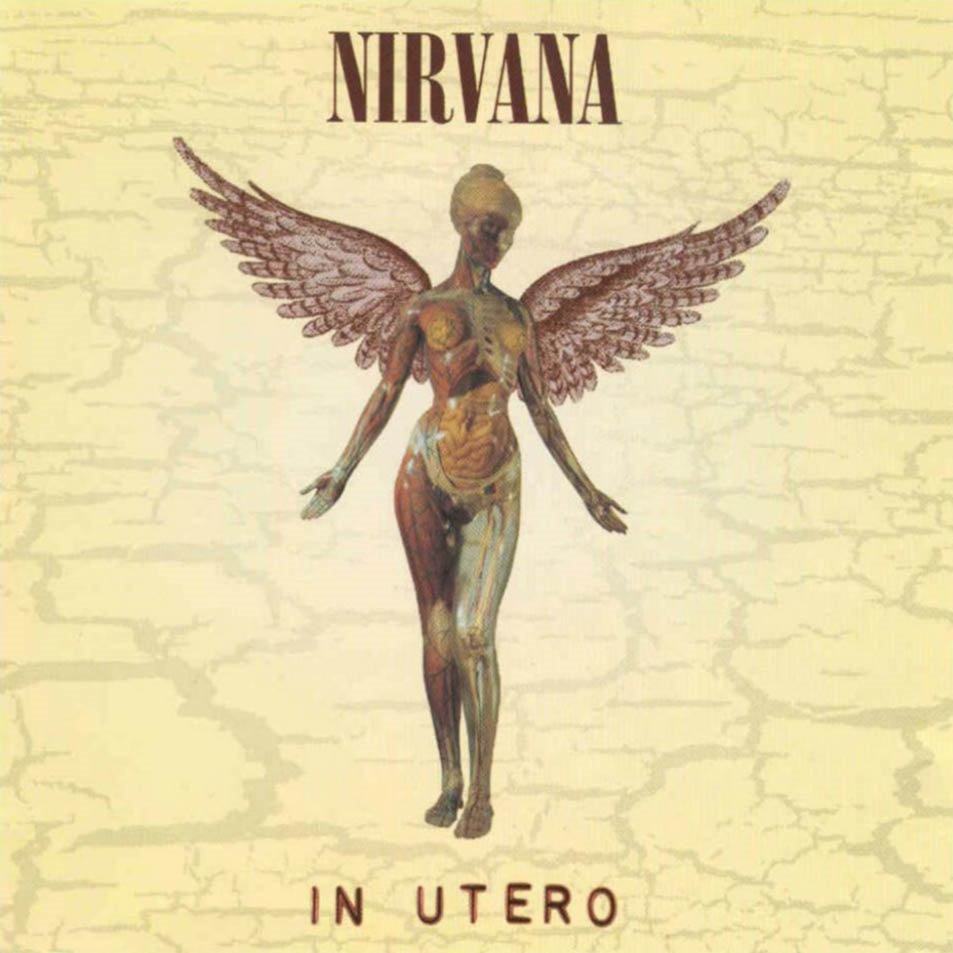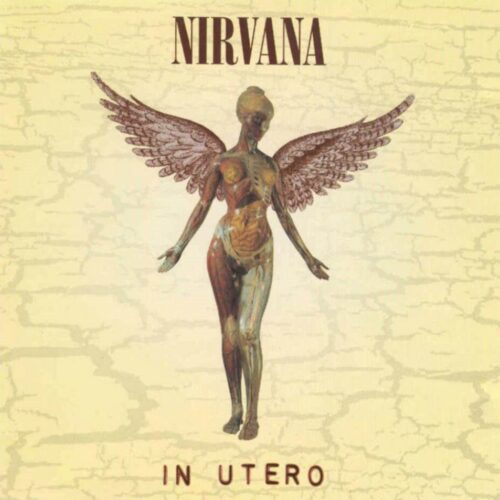In the two decades since In Utero‘s release, people have talked as much about what it isn’t as they have about what it actually is. And that’s probably with good reason, because you can still come at it from two angles.
Firstly, and probably the view favoured by devotees, it’s the rawest, most howlingly aggressive and sarcastic rock record ever released on a major label. Secondly, it should’ve been the most howlingly aggressive… you get the idea.
Should we just accept the Geffen-approved Scott Litt remix with its Nevermind-aping double-tracked vocals, or should we ride bareback towards Steve Albini’s radio-unfriendly original mix? If Wikipedia is to be believed, Albini made a cool $100k for his effort and, given his famously ‘robust’ attitude towards recording and bands in general, you can probably bet that he doesn’t give a single grubby bum-vom about which version ended up being released. The authenticity debate has raged on for every one of the album’s 20 years in existence, and we’re still no further forward. They don’t sound that different to each other anyway, so why get bogged down?
Confusion still abounds around how we should view In Utero now that it’s reached its third decade. Trouble is, there were so many extenuating circumstances, production disputes and angry wives that the album’s life afterwards stood no chance of a bare-bones analysis. Basically, it’s an album that never got a proper review. So it’s about time it did.
Nirvana’s third proper album, if you’re not counting the endearingly slap-dash bindle-bundle of session tracks and doodles that was Incesticide, is their howl at the moon, their schizophrenic apogee, their gunshot into the abyss. Even before they play a proper musical note on In Utero, they’re taking the piss. The first thing you hear on ‘Serve The Servants’ is three stick-clicks. Three stick-clicks – not four, not eight, not a hollered ‘one, two, three, four!’, but three stick-clicks. Nirvana had become so tired of conventional rock & roll that they set about trying to debunk as many of its bad habits as possible.
The album is full of these little tics, tiny and petulant gestures that amount to Cobain saying, "Fuck you if you don’t understand why I’ve drawn a cock on the wall. I just drew it." Those stick-clicks and faux-blues riff on ‘Serve The Servants’, the FM DJ impression he does at the beginning of ‘Tourette’s’, comically over-poetic lyrics on ‘Heart Shaped Box’ that essentially describe Courtney Love’s tunnel of love and its apparently substantial roadworks… it’s relentless. So to try and balance this with normal rock music with emotional lyrics should logically sink the album in seconds. But it’s actually the reason it works so wonderfully.
Self-sabotage was, at the time of grunge and alternative rock’s sarcasm-laced heyday, the number-one goal of any songwriter. The only way to supersede a completely perfect rock song was to stand back from your composition and declare it a total misfire before it was over, safe in the knowledge that you’d messed it up yourself and for a good reason. Stephen Malkmus built a career on it. But on In Utero self-sabotage is a character in the drama, constantly the laughing fool to Cobain’s best attempts to make a credible rock song. It’s worth noting that Cobain told Rolling Stone’s David Fricke that the discarded song and album title ‘I Hate Myself And I Want To Die’ was "totally satirical, making fun of ourselves. I’m thought of as this pissy, complaining, freaked–out schizophrenic who wants to kill himself all the time. ‘He isn’t satisfied with anything.’ And I thought it was a funny title."
When Cobain did write credible rock songs, something that by this point he’d come to find preternaturally easy, it came not so much as a shock as it did a reminder. He had written several classic songs before 1993, but the confusion around the recording and up to the release of In Utero had maybe dimmed expectations. Nowadays the songs are so well-engrained in the music press’ list culture that it’s easy to forget how backwards and interesting a lot of them were and are; both in 1993 and today.
‘Scentless Apprentice’ takes a decadent Patrick Suskind horror novel as its source material, but has pachydermic weight and cartoon-like levels of hysterical volume. ‘Very Ape’ is a Wipers-y ascent of a demonic scale. As already mentioned, ‘Tourette’s’ is a caustically unpleasant and brutally entertaining shrug of the shoulders. Each little slice of the album brings with it new parameters for a band that everyone thought had already reached them. Constraint, from their new-found position as poster-boys, encouraged a creative explosion that not even the band knew how to deal with.
But it’s the songs where Cobain is at his most arch that things begin to get multidimensional. Could the same person who wrote ‘About A Girl’, a song about not pushing the hoover round quite frequently enough, have written something as difficult to analyse as ‘Rape Me’? On the one hand it’s an anti-rape anthem, but with the added confusion of a karmic belief that those who rape will eventually be raped more violently, and the rather bold decision of choosing a song called ‘Moist Vagina’ as the b-side for its single release; on the other it’s a song about media intrusion (or so it’s been argued – Cobain himself plumped for the former). The point is, using only a select handful of words, the song affronts and dazes its audience completely. Which is sort-of what the whole songwriting game is about, isn’t it?
And it’s of no little importance or interest to note that the single sleeve for ‘Rape Me’ and ‘Moist Vagina’ (the former was packaged as a double a-side with the rather less confrontational ‘All Apologies’) shows a male seahorse giving birth. Sexual politics doesn’t even start to cover it.
For all its lyrical spectator-baiting, ‘Rape Me’ is the closest musical cousin to the Nirvana of 1991. Songs like ‘Radio-Friendly Unit Shifter’ and the aforementioned ‘Scentless Apprentice’ take Nirvana’s Pixies-derived template to its least tonal extremes. Cobain’s screaming at the end of ‘Scentless Apprentice’ make mincemeat of even Steve Albini’s microphones, suddenly bursting through the sepia-tinged, controlled sound and galloping into the foreground. It’s perhaps the strongest indicator that there were two distinct strands to Nirvana’s music on In Utero: brave and interesting subject matter, and a childish desire to undo any good work that subject matter might do. In this case, wet nurses, semen, flowers, mushrooms and gas fumes make up the oft-referenced biological and maternal influences that Cobain was helplessly drawn to, and the throat-exploding screams at the end are the undoing.
After the album has rolled through several iterations of this formula, some with strong self-sabotaging tendencies and some with barely any (the outsider strum-along ‘Dumb’, the earnest account of depression and chronic stomach pain ‘Pennyroyal Tea’), we come to Cobain’s final assault. ‘All Apologies’ is, despite the author’s previous form for smashing his authenticity to bits at the drop of a hat, his most sincere song. Initially bright and contemplative, even relaxed, it wanders rather than charges like the rest of the album. His petulance has turned to excuse, to inadequacy and to apology. "What else should I be?" he asks. "What else should I write?"
As it crawls to a close, bass drone and guitar feedback sparring tranquilly in the background, a feeling not present on any other Nirvana record takes over – calm. The vocal harmonies are, to inappropriately reference talent show parlance, en-pointe right until the very end when, unable to resist, Cobain takes his foot off the gas and lightly fluffs and growls the last couple of phrases on purpose. But the point is that the last major work Nirvana recorded ends on a note of calm, and with a sense that everything the album set out to achieve has been at least attempted, even if those aspirations were confused throughout.
The context of 20 years’ worth of listening, analysing, conjecture and folklore cannot be erased, so we’ll never really be able to judge In Utero on its musical and artistic merits alone. It’s just too caught up in other things. But hopefully what we can do now is perhaps listen to it much harder than before, and not in such a technical way. It doesn’t matter how it was recorded or mixed (above is a very handy YouTube video explaining how the Scott Litt and Steve Albini mixes differ), it matters that Kurt Cobain was in some respects a confused puppy of an artist who didn’t know the best way to present himself, so sometimes he just pissed around. Then sort-of regretted it, so tried not to piss around as much. Then thought he was being too serious, so pissed around again.
In the now-famous Lollapalooza-lampooning episode of The Simpsons, one disaffected youth in the crowd for the Smashing Pumpkins turns to the other when he appears not to be enjoying the set, saying, "Are you being sarcastic?" The reply comes: "I don’t even know any more." It’s tempting to fall into that mindset with In Utero, purely because of the revolving axis of irony and self-reference at absolutely every turn. But unpick them all sufficiently and you’ll still, after two whole decades, find a record that spits and scratches more than it strokes but, like any injured animal, all it really wants is a bit of love. Is it the most howlingly aggressive and sarcastic rock record released on a major label? Probably not. The argument is redundant.



